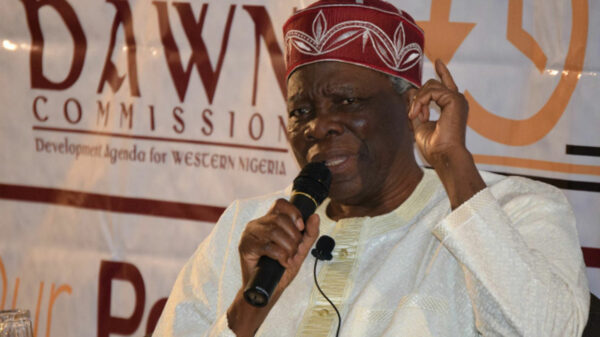
Ilé-Ifẹ̀ – No fewer than 29,000 Yoruba people have been killed by Fulani terrorists in South-West Nigeria, the National Leader of the Yoruba Self-Determination Movement, Professor Emeritus Adebanji Akintoye said on Monday, adding that the suspected criminals continue to rape women and subject others to all sorts of atrocities.
Prof Akintoye, while renewing his call for a sovereign Yoruba country separate from Nigeria, charged monarchs and governors of Nigeria’s southwestern states to declare September 23 as Yoruba Unity Day.
The renowned historian said this in a statement to mark the anniversary of Yoruba Unity Day 2024, held in Ilé-Ifẹ̀ on Monday.
Prof Akintoye emphasized that given the continued threats to life and destruction of farmlands, the only option left is to separate Yoruba Nation from Nigeria.
“The only viable and sustainable answer to all this horrible situation is to separate our Yoruba nation from Nigeria, and to establish our own country where we shall be able to exercise our sovereignty to provide security for our land and people, and where we shall be able to run our economy decently in the way that we Yoruba know,” he said.
“In the rural areas of our homeland, where probably the majority of our people live, the Fulani people who are determined to seize land for a homeland of their own, are daily killing our people, have killed a roughly estimated 29,000 of our people, are raping our women, kidnapping men, women and children, extorting millions of Naira in ransom for the kidnapped, destroying farms, food barns and villages.”
Prof Akintoye, who called on the South West governors and traditional rulers to adopt the Yoruba Unity Day as a public holiday, said: “Obas, the fathers of our nation, should adopt this Yoruba unity day in their Councils of Obas in all our Yoruba States. I urge that our Governors, when they assemble in their Southwest Governors meeting, to adopt this Yoruba unity day for all our states.”
He implored Yoruba people to join the self-determination struggle, saying: “We are seriously pushing for the separation of our Yoruba nation from Nigeria and the Nigerian disaster is different. Our perception of the Nigerian situation is not self-centred. It is not emotional. It is intellectually sound and realistic. And it is accepted by at least 80 per cent of all our Yoruba at home and in the Diaspora. Objectively, there is good reason to fear now that the Nigerian situation could destroy our Yoruba nation.”
On the creation of the southwest security outfit, codenamed Amotekun, Prof Akintoye said: “There was some hope when our Governors created Amotekun some years ago to resist the Fulani rampages, but Fulani people in control of the Federal Government have contrived the impotence of Amotekun. The Fulani terrorists are also becoming increasingly audacious in crimes and barbarism in our main cities.
“Our kinsman who won election as President of Nigeria is being made to face ever-mounting harassment, including threats of military overthrow, threats of wholesale regional rebellion, and even a defiant declaration of war.”
The Yoruba National Unity Day celebration in Ilé-Ifẹ yesterday, Monday, 23 Septemberc 2024, was held in commemoration of the 138th year after the signing of a peace treaty on September 23, 1886, following the Kiriji war which was fought for 16 years, between 1870 and 1886.
During the war, all of the subethnic groups of the Yoruba either supported the Ibadan or the Ijesha . The main reason for the civil war was an attempt to halt the expansive efforts of the Ibadan city-state, which attempted to replace the Oyo Empire as the dominant region in Yorubaland.
The fall of the Oyo Empire, which had dominated the region for 500 years, left a gap in the government of Yorubaland. Many city states, which were previous provinces of the empire, rose up to replace the dominant Oyo Empire, including Ibadan. Ibadan had won the 1840 Osogbo War and the Battle of Ijaiye in 1862 and had grown in immense power, almost rising to that of its predecessor.
Several of the nineteenth century wars in Yorubaland resulted in desertions and family separations.
FULANI
The conflict between Fulani herdsmen and farmers in Nigeria has been a longstanding issue, resulting in violence and loss of lives.
The Fulani people are believed to be the largest semi-nomadic group globally, found across West and Central Africa. In Nigeria, some continue to live as semi-nomadic herders, while others have moved to cities. Unlike city dwellers, the nomadic groups spend most of their lives in the bush and are often involved in clashes with farming communities, and also engage in kidnapping for ransom. They herd their animals across vast areas, frequently clashing with local farmers.
The herders now bear sophisticated weapons and use them to terrorize many parts of the country, with security operatives ignoring many of the attacks for allegedly not getting orders to go after the criminals.
Several brutal attacks happened under former President Muhammadu Buhari, who was born to a Fulani family on 17 December 1942, in Daura, a town in Katsina State, Nigeria.
The continuous unprovoked attacks triggered resistance in South-East region, inhabited by Igbo people and South-West region, inhabited by the Yoruba people.
A Yoruba activist and philanthropist, Chief Dr Sunday Adeyemo, aka Sunday Igboho, demanded end to the attacks that have cost lives of thousands. He asked the Fulani people to vacate all the forests in South-West.
As the Akoni Oodua of Yorubaland, Sunday Igboho is known for fighting for the rights of the Yoruba people. He is currently advocating for a sovereign Yoruba country.
